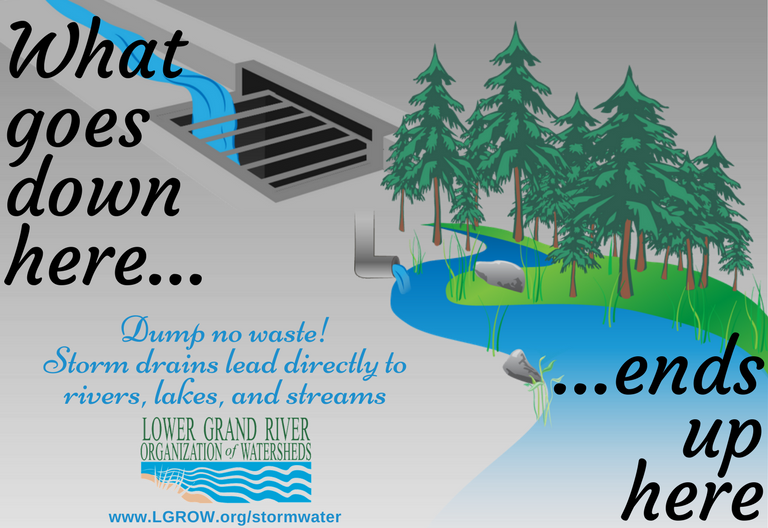How to Reduce and Report Pollution Entering the Grand River
When it rains, water that isn’t soaked into the ground flows across the land, eventually making its way into our local waterways. This water is called ‘stormwater.’ The area that water flows over on its way to a river or stream is called a watershed (Find out what part of the Lower Grand River Watershed you live in using our Find Your Watershed tool). As stormwater passes over hard surfaces like streets and parking lots, it can pick up pollutants such as oil and grease from parking lots and roadways, excess fertilizer from lawns, pet waste, and eroded soil. Locally, this stormwater is not treated but is discharged directly to the Grand River and its tributaries through storm sewer systems and drainage ditches. Dumping anything into storm drains, including yard waste, is illegal and pollutes our waterways! If you see something being dumped into a storm drain that doesn’t belong, please contact your local community or the Michigan Department of Environmental Quality to anonymously report it. Reporting information can be found at www.lgrow.org/report.
Here are a few ways YOU can reduce stormwater pollution entering the storm sewer system and waterways in your community. For more information, check out: www.lgrow.org/stormwater.
- Pledge to properly dispose of any pet waste in a closed trash receptacle. Pet waste is raw sewage and contains harmful bacteria, easily transported through stormwater.
- Keep lids closed on dumpsters and outdoor trash cans.
- Keep storm drains near your home clear of litter by disposing of trash and recyclables in proper containers.
- Collect yard waste to prevent grass clippings and leaves from clogging the storm sewer system.
- Avoid fertilizing your lawn before a storm, use per the manufacturer’s recommendations, and sweep up excess fertilizer on hard surfaces like sidewalks, driveways, and roadways.
- Ensure that soiled water and other wastes from car washing practices do not enter the storm sewer system by washing your car on grass or gravel, rather than your driveway. Better yet, take your vehicles to a commercial car wash that sends wash water to the sanitary sewer.
- Reduce stormwater runoff by planting rain gardens and using rain barrels in your gardens to prevent water from leaving your property.
- Be Septic Smart! Maintain your septic system to protect your family's drinking water and reduce the risk of contaminating local water.

